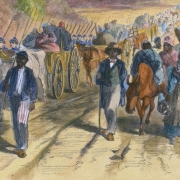The Titan Among The Enlightenment’s Giants.
Poetic Justice Warriors represent many disciplines of human endeavor – philosophers, inventors, entrepreneurs, economists, writers, statesmen, educators, publishers, self-made men, and defenders of the natural rights of man, but no one has led his peers in all of them except Poetic Justice Warrior Benjamin Franklin. However, one of Franklin’s notable attributes, one that is unique to him, was that of a humorist.
Poor Richard Saunders
In the early days of mass publication, pamphleteering was a common way to communicate political ideas, and the newspaper industry was in its infancy. At the time, many articles were published under the byline of fictitious names, or pseudonyms. Franklin was no exception, and he used this technique to his advantage. This didn’t happen on its own; as a young boy Franklin was a voracious reader who would borrow books in the evening, read all night, and return them early the next day. And he taught himself creative writing techniques by rewriting the essays of others from sparse notes, and converting his own prose into poetry, and then back to prose, all to improve his vocabulary.
At age 15 Franklin created his first pseudonym, Silence Dogood, and secretly contributed a column to his older brother’s paper because it never would have been published otherwise. In it he would poke fun at various contradictions and injustices, and in one such article Silence explained,
I am naturally very jealous for the rights and liberties of my country, and the least appearance of an encroachment on those invaluable privileges, is apt to make my blood boil exceedingly.
A few years later Franklin created two other pennames, Martha Careful and Celia Shortface, and wrote a series of letters to the editor of a Philadelphia paper that were humorously critical of another paper’s abortion articles. Franklin was eventually able to buy the rival paper and shortened the name to The Pennsylvania Gazette.
At the age of 26, in 1732, Franklin began the publication he is most famous for, Poor Richard’s Almanack, and again used humor and wit to best his rivals in the publishing business – they were no match. But there was more to his writing than a humorous turn of phrase. Franklin was best known for inspiring others in behaviors for living well, especially among America’s rising entrepreneurial class, or as columnist Jon Hersey explains:
These proverbs helped make Franklin a symbol of the self-made man: he who helps himself by helping others. Franklin’s focus on mutual benefit proved to be another aspect of his tremendous success.
By the time Franklin was 42 years old he was wealthy, retired from his printing empire, and a philosopher whose inspiration was known and felt throughout the colonies, and he literally had the second half of his life ahead of him.
The Poetic Justice Warrior
In June 1775, the Continental Congress established a network of post offices in order to ensure the rapid transmission of information throughout the colonies, and appointed Franklin, America’s Interconnected Individual, its first Postmaster General, In December 1776, Franklin arrived in Paris as America’s ambassador to France, for the express purpose of winning the French over as an ally in the war with the British. Of course, this was not going to be easy, and Franklin was the only man in the world up to the task. He was already a world renowned scientist, journalist, and philosopher. Or as President John Adams relates:
There was scarcely a peasant or a citizen, a valet de chambre, coachman or footman, a lady’s chambermaid or a scullion in the kitchen, who was not familiar with Franklin, and who did not consider him as a friend to human kind.
In France, Franklin was a charming conversationalist who could speak with natural elegance in a straightforward manner. The man was a scholar who had taught himself five languages, started America’s first volunteer fire department, and city police force. With the successful prosecution of the war for personal liberty, Franklin returned to America to join another campaign, one that would eventually extend natural rights to all Americans. In 1787, he was elected president of the Pennsylvania Society for the Abolition of Slavery. In 1789 it issued a statement:
Slavery is such an atrocious debasement of human nature, that its very extirpation, if not performed with solicitous care, may sometimes open a source of serious evils. The unhappy man, who has long been treated as a brute animal, presents a serious duty incumbent on us, to instruct, to advise, to promote in them habits of industry, to furnish them with employments suited to their circumstances, and to procure their children an education.
The Constitutional Conventioneer
With the failure of the Articles of Confederation, delegates from every state except Rhode Island convened in Philadelphia, in 1787, to fix the problem. Pennsylvania’s delegate was the 81 year old Benjamin Franklin, who along with George Washington, James Madison, and Alexander Hamilton, would have the greatest impact on the Convention. In fact, Thomas Jefferson had previously commented on both Washington and Franklin by saying that he “never heard either of them speak ten minutes at a time, nor to any but the main point. They laid their shoulders to the great points, knowing that the little ones would follow themselves.”
What the Convention ultimately constructed was a Constitution using Madison’s Virginia plan as its foundation. Historian Donald T. Phillips explains:
It was a completely new idea. A simple proposal that, when presented to the convention at large, caught all the other delegates by surprise. It was imaginative, creative, audacious, and almost radiant in its artistic balance and symmetry.
This achievement was characterized by John Adams as “The greatest effort of national deliberation that the world has ever seen.” George Washington simply declared the Constitution “a miracle.” During the signing ceremony, Franklin gazed upon a painting behind Washington’s desk, it was of the sun low on the horizon, and mentioned that painters “often found it difficult to distinguish in their art a rising sun from a setting sun. But now at length, I have the happiness to know that it is a rising not a setting sun.”
Common Sense Inspiration
Poetic Justice Warriors inspire people to act, they give people a sense of purpose. Prior to the American Revolution, Franklin inspired the British commoner Thomas Paine, who was a failure at everything he tried, but a passionate writer, to become a pamphleteer in America. The first of many editions of Common Sense was an immediate sell-out. After the Revolution began, he inspired General Washington to hire the Prussian Baron von Steuben as Inspector General of his army at Valley Forge, and turn a ragtag, ill equipped group of volunteers into a formidable fighting force.
But most importantly, Franklin was an inspiration to every strata of society. In the 18th century, it was commonly believed that aristocrats and commoners would live and die as such, but Franklin worked to erase this distinction. He was a commoner who became a wealthy self-made man, who lived a life of reason, purpose, and pride, and fought for all Americans, including the children of slaves, to be able to do the same. Upon learning of Franklin’s death in 1790, the National Assembly in France called for three days of national mourning in homage to –
The rights of man and to the philosopher who has most contributed to extend their sway over the whole earth. Antiquity, would have raised altars to this mighty genius, who, to the advantage of mankind, was able to restrain alike thunderbolts and tyrants.
Poetic justice served. Poetic Justice Warriors wanted.





